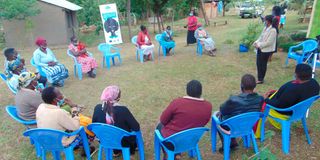From tradition to justice: The legal remedies for survivors of harmful practices

Widows at a legal training on matters of property inheritance in Eldoret in June 23, 2021. Women and girls must be empowered to understand their rights and seek justice without fear.
What you need to know:
- Kenya has robust laws against harmful cultural practices like FGM, child marriage, and widow inheritance, including constitutional protections and specific acts that criminalise these violations.
- Despite legal frameworks, enforcement remains challenging, but women can seek help through police reports, protection orders, and court interventions.
Dear Vivian,
In many parts of Kenya, harmful cultural practices such as child marriage, female genital mutilation, and widow inheritance continue to undermine the rights and wellbeing of women and girls, despite legal prohibitions. What legal remedies are available for women affected by these practices, especially in communities where such customs are deeply entrenched?
Asafar,
Women’s rights champion,
Lodwar
Dear Asafar,
Kenya has made significant legal strides in addressing harmful cultural practices such as female genital mutilation, child marriage, and forced widow inheritance. Despite being deeply entrenched in certain communities, these practices violate fundamental human rights, including dignity, equality, and freedom from violence. The Constitution provides strong protections against such violations, emphasising that no cultural practice should infringe an individual’s rights. Additionally, laws such as the Prohibition of FGM Act, the Marriage Act, the Sexual Offences Act, and the Protection Against Domestic Violence Act explicitly criminalise these practices, ensuring that perpetrators are held accountable.
While these legal provisions exist, enforcement remains a challenge, and many women and girls continue to suffer. However, several legal remedies are available to those affected. Survivors can report cases to the police, local administrators, or gender and children’s offices, where law enforcement agencies are mandated to investigate and prosecute offenders. In cases of forced marriage or widow inheritance, victims can seek protection orders from the courts to restrain perpetrators from subjecting them to these violations.
Read more: Harmful practices: How Tujukumike initiative is empowering the vulnerable in Tharaka Nithi
Kenyan courts have also played a crucial role in safeguarding the rights of women and girls. In past cases, individuals have been convicted for performing FGM, reinforcing the seriousness of the offence. In other instances, courts have annulled child marriages, emphasising that customary laws cannot override statutory protections. A notable case on forced widow inheritance reaffirmed that such customs violate the constitutional rights to dignity and equality, setting an important precedent for women seeking legal redress. These rulings demonstrate that the Judiciary is willing to uphold the rights of survivors and ensure that justice is served.
Beyond legal action, addressing harmful cultural practices requires a combination of community awareness and systemic interventions. Many survivors fear retaliation or stigma, making it difficult for them to report violations. Therefore, community engagement through sensitisation programmes, alternative dispute resolution, and collaboration with local leaders can help change societal perceptions and encourage survivors to come forward. Civil society organisations continue to play a critical role in this advocacy, pushing for the full implementation of the law and providing safe spaces for affected individuals.
The fight against harmful cultural practices is not just a legal battle but a societal one. While Kenya has a strong legal framework to combat these violations, the real challenge lies in enforcement and shifting deep-seated cultural beliefs. Women and girls must be empowered to understand their rights and seek justice without fear.
Legal remedies exist, but for them to be effective, survivors need protection, community support, and access to justice mechanisms. The journey towards ending these practices requires collective action from the government, civil society, law enforcement, and the communities themselves. If you, or someone you know, are/is affected by such practices, do not hesitate to seek legal help.
Vivian
The writer is an advocate of the High Court of Kenya and award-winning civil society lawyer ([email protected]).





